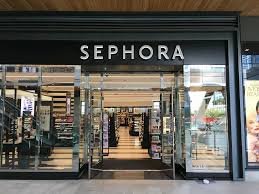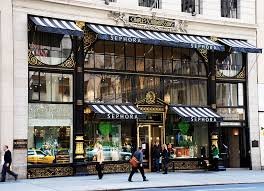Glossed Over: Sephora Tweens
The new generation of tween girls is obsessed with beauty trends. Is this a harmless new reality, or is it a sign of larger, problematic ideas in our society?
That is not what I looked like in middle school. Lots of comments agree with me.
I see these girls on TikTok with matching Lululemon sets, glossy, straightened hair, and impressively well-done makeup. Am I jealous of these middle schoolers? My instinct is to say no, but when I compare them to my middle school self with her frizzy hair, Kohl’s T-shirt, and baby face, it’s hard not to feel a twinge of envy. They seem so cool and put together, and they know it. The Sephora tweens have taken over social media, and lots of people have lots to say about it.
COURTESY IMAGE // PHILLIP PESSAR
What is a Sephora tween? The term is so young that it is yet to have a concrete definition, but it generally describes girls ages 9-12 who are obsessed with Sephora. But after closer inspection, this label carries much more weight than just a passion for the makeup superstore. They love specific products, like the Sol de Janeiro perfume or the Drunk Elephant bronzing drops, both of which are known for their bright and colorful packaging. They probably know more about skincare than I do, and they love their Lululemon clothes and Stanley cups. Essentially, they are girls who are much more aware of trends, especially in the beauty community, than girls of that age have been in the past. They have the same hobbies and interests that I began to develop in high school.
The first time I saw this term used with a negative connotation, I rolled my eyes a bit and assumed the internet had come up with yet another way to make fun of girls for having hobbies and interests. This may be partially true, but the more videos I saw about Sephora tweens, the more I realized it is an issue for these girls themselves. They feel like they have to grow up faster, developing more mature interests at increasingly younger ages. Girls as young as 10 are focusing on these beauty trends, and there’s no way that it isn’t damaging their self-image. They start anti-aging routines and acne prevention treatments before even hitting puberty. The Sephora tween trend exemplifies society’s pressure on women to keep looking like they did in their 20s, placing most of their value on their looks. The audience for this pressure is just expanding to a younger audience, and to no one’s surprise, it’s mostly because of the internet.
The Sephora tween idea developed primarily on TikTok, an app infamous for the disastrous effects it has had on many users’ self-confidence and mental health. It’s full of people showing off, intentionally or otherwise, and almost seems built for users to compare their lives to those they see online. For a younger and more impressionable audience, like the Sephora tweens, these comparisons and ideas of what is best are taken straight to heart. Unfortunately, because of the mass production of content on TikTok, there’s no truly effective way to filter and censor content for younger viewers.
COURTESY IMAGE // NORMAN Z
There is an overwhelming amount of beauty content on TikTok, and since the rise of the Sephora tweens, this content has been increasingly targeted for and created by younger people. This media may be entertaining in moderation, but when young girls are overloaded with images of what is “good” or “popular,” especially in regard to physical appearances, it can seriously alter their perception of themselves and what is “normal” for them to look like. That is one of the most concerning parts: Although it seems unnatural to older audiences like me reflecting on their tween years, many Sephora tweens say that they view this more mature look as the new normal.
Additionally, making these videos is becoming commonplace for these tweens. And while it may be a fun hobby, certain safety concerns arise from this content creation. Lots of girls post these TikToks with public accounts, meaning anyone on the internet can find them. At such a young age, it’s hard to have a comprehensive understanding of internet safety, and when parents don’t fully understand TikTok, the problem only becomes worse. On these videos, often “Get ready with me” vlogs and shopping hauls, the comments can sometimes raise concerns. Many compliment the girls with seemingly kind intentions, but while scrolling through comments, I can’t help but notice they are all appearance-centered compliments, whether it’s a simple “you’re so pretty!” or “I love your hair.” These girls are being trained at a worryingly young age to seek and appreciate external validation, especially about the way they look.
Peer pressure has always been an issue for tweens and teens, but the Sephora tween trend places pressure on increasingly more expensive, mature, and material items. When I was a tween, peer pressure felt more focused on how you acted and who you were friends with. Now, it’s about what clothes you wear, what beauty products you have, and how in tune with TikTok trends you are. Are “Sephora tweens” simply the way tweens behave in this technologically advanced world? Or is there simply societal pressure for girls to grow up faster? Many older teenage and young adult girls have expressed feeling sorry for these tweens, wishing they could experience their childhood and middle school years the way girls did a couple of years ago — before the popularization of TikTok and social media usage at so young an age. Having time to develop your identity and be a little bit weird is an important part of growing up. Everyone has an awkward phase as a tween or teenager, and there’s something tragic in this new generation of girls not feeling welcome to go through these phases.


